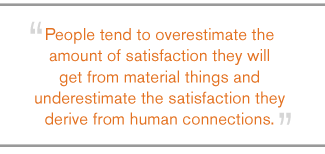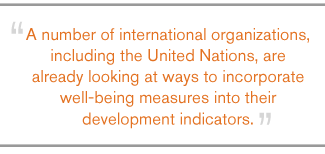This article is the second in a two-part series.
Money can't buy happiness -- but it sure seems to buy a lot of life satisfaction. When ║┌┴¤═° asked respondents in 130 countries and areas to rate the quality of their lives, the percentage of positive responses in a given country was highly correlated with that country's per-capita income level.
 |
Though the study of what makes people in societies around the world feel positive about their lives begins with their relative economic status, it doesn't end there. The presentations at a recent forum on global well-being in Washington, D.C., made it clear that promoting well-being around the world is a multifaceted challenge. Factors such as a person's age, the type of governance he or she lives under, and the support of friends and family influence well-being, and economic terms can't fully explain them. As the forum's keynote speaker, Alan B. Krueger said, "Much of what contributes to well-being happens outside markets."
It seems ironic to hear such a claim coming from a noted economist. But noted economists -- John Helliwell of the University of British Columbia and Krueger and Angus Deaton of Princeton University -- addressed three of the most intriguing questions about the non-economic aspects of well-being at the forum. Their research shows the range of thinking about how well-being can be measured and cultivated around the world.
"How do our social lives affect our well-being?"
John Helliwell's work regards an individual's life experiences as made up largely of the patterns of relationships he or she maintains with others. As the codirector of the Program on Social Interactions, Identity, and Well-Being at the Canadian Institute for Advanced Research, Helliwell studies how the quality of those relationships affect -- or even drive -- well-being.
Helliwell's research has shown, for example, that among employed people, trust in management predicts life satisfaction more reliably than health, marital status, or income level. In particular, women's level of trust in the workplace is likely to influence their life satisfaction. "Women have different values for the workplace," Helliwell noted. "They're more likely to say, 'Of course! The flexibility I need for my work-life balance is only obtainable in a high-trust environment."
More generally, Helliwell says that people tend to overestimate the amount of satisfaction they will get from material things and underestimate the satisfaction they derive from human connections. That's one reason so many people choose a work environment that ends up making them miserable. But trusting relationships are crucial in other contexts, as well, such as communities. In a recent study of neighborhoods in Toronto, Helliwell and his colleagues found that trust in neighbors was the most important variable in explaining differences in average life satisfaction across census tracts.
Helliwell has also taken a preliminary look at trust issues at a global level using ║┌┴¤═° World Poll results for questions such as, "If you were in trouble, do you have relatives or friends you can count on to help you?" His initial study suggests that international comparisons of social trust should look beyond citizens' perceptions of the presence or absence of official corruption. "Trust is more than that," he says. "It's what permits you to move ahead, because in a climate of trust, you're willing to do things together to share in building the future."
"Is our well-being influenced by how we spend our time?"
The American author Annie Dillard wrote, "How we spend our days is, of course, how we spend our lives." Krueger, Bendheim Professor of Economics and Public Affairs at Princeton University, has taken this maxim to heart in his approach to measuring well-being, which considers individuals' use of time as one dimension by which populations can be compared and evaluated.
The Princeton Affect and Time Survey (PATS), designed by Krueger and others, and first administered by ║┌┴¤═° in 2006, asks a random sample of Americans to recount the activities they engaged in the previous day -- from working to shopping to watching TV -- then to rate their emotional state during randomly selected "episodes." The resulting index, which Krueger calls the "U-Index" (the "U" stands for "unpleasant"), is the amount of time spent in a state in which the most intense feeling is a negative one -- such as stress, sadness, or pain.
Krueger's 2006 results indicate that Americans with lower income and education levels spend more time in an unpleasant affective state than their higher-paid and better-educated counterparts, and that women spend a little more time in an unpleasant state than men (19.6% of the time for women versus 17.6% of the time for men). Krueger also found that stopping to smell the roses -- and perhaps giving thanks for them -- is important to maintaining a healthy emotional state. The lowest U-Index scores occurred during participation in religious activities and leisure activities such as exercising, dining, and socializing.
Krueger also examined World Poll results for one low-scoring U-Index activity: the amount of time respondents said they spent socializing with friends the previous day. The average figure varies widely by country -- from 1.6 hours in Myanmar and 1.7 hours in the Philippines to 8.9 hours in Paraguay and 9 hours in Uruguay. He found that the country's results correlate highly with its population's average scores on ║┌┴¤═°'s life satisfaction scale. As Krueger concluded, such findings raise many questions about exactly how time use translates to well-being.
"Do we get happier or unhappier as we get older?"
This question is one that intrigued Angus Deaton, the Dwight D. Eisenhower Professor of International Affairs and Professor of Economics and International Affairs at Princeton. Deaton addressed it by using the ║┌┴¤═° World Poll's 11-point life satisfaction scale to test for differences by age category in populations at different socioeconomic levels.
 |
Deaton found that older people are happiest in rich countries, while among younger respondents, gains in life satisfaction taper off more significantly as one moves up the scale from poorer to richer countries. The result is that in the poorest countries, older people are the least likely to give their lives a positive rating -- but in the richest countries, they are the most likely to do so. In other words, as Deaton noted, the degree to which aging makes you unhappier is to some extent dependent on your country's average income. (See "Worldwide, Residents of Richer Nations More Satisfied" in the "See Also" area on this page.)
Similarly, Deaton examined the correlations between age, average income, and health satisfaction among the populations of different countries and found that controlling for countries' average income levels wipes out much of the relationship between respondents' age and their likelihood to claim satisfaction with their health. That is, while older people in poor countries are much less likely than younger people to be satisfied with their health, in rich countries the differences are slight.
Deaton concluded that the strong relationship between a country's per-capita income and its average life satisfaction level helps establish that life satisfaction can be a reliable analytical tool for investigating the relationship between wealth and happiness. However, noting that life satisfaction ratings aren't strongly related to objective health measures, such as life expectancy or the prevalence of HIV in a country, he cautioned against using average life satisfaction as a summary measure of well-being across countries.
The well-being portfolio
Social relations, time use, and life cycle are powerful lenses through which to view well-being, and all three cut across cultural and socioeconomic settings. Other promising approaches do the same, suggesting the opportunity for researchers to build a diversified tool kit for leaders and policy-makers seeking approaches to promote well-being among their constituents.
That's important, because economic growth not only goes a long way toward explaining global variation in well-being, but impressive growth also relies to some extent on the confidence and optimism of leaders and innovators within a population. Alternative strategies for boosting well-being may offer new ways to "activate" people, jump-starting a positive cycle in which improved well-being leads to better economic outcomes and vice-versa.
As psychologist Ed Diener noted at the well-being forum, a number of international organizations -- including the United Nations and the Organization for Economic Cooperation and Development -- are already looking at ways to incorporate well-being measures into their development indicators. Such developments lend credence to Diener's claim that a well-being revolution will soon be underway.